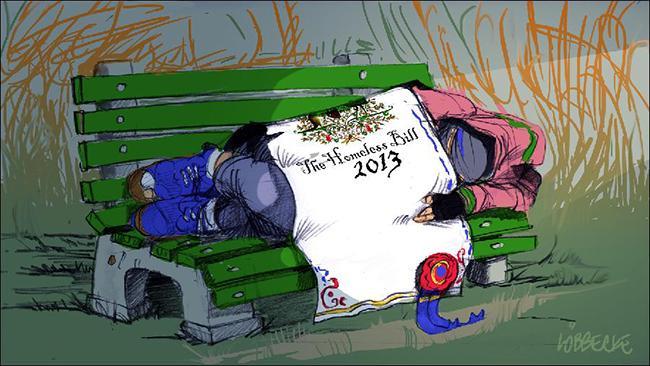
SOMEONE needs to help Kevin Rudd pack, for it was surely only poor suitcase-management skills that obliged him to carry his sleeping bag to Canberra in his hand luggage. There have been suggestions, entirely unfounded, that this was no mere oversight but a display of conspicuous compassion, that the sleeping bag was merely a prop to tell the world that Rudd is a decent sort of chap, the kind who would sleep rough in the middle of winter to raise money for the homeless.
If you're looking for hand-wringing symbolism, however, a statement that says merely, "I feel your pain", it is hard to beat the Homelessness Bill 2013, that is solemnly progressing through parliament and could be law by the end of the week. Indeed "law" may be putting it a little strongly, for this is an instrument with no legislative purpose, other than to proclaim that the government's heart is in the right place.
Full marks to the Minister for Housing and Homelessness, Mark Butler, for keeping a straight face during his second reading speech. "This bill," he told the house, "is aimed at increasing recognition and awareness of people who are homeless or at risk of homelessness."
That is all there is to this spineless, sanctimonious statute -- enlarged recognition and awareness raising. Its passing will be without consequence; homelessness will be as miserable an experience as it has always been, and the chances of finding a home will not have improved one jot. The act comes with no funding and no specific measures. Indeed, since homelessness is almost entirely a state concern, there is little the commonwealth can do except wring its hands and dole out money if it has any, which it hasn't.
Yet somehow, Butler managed to pad out his second-reading speech for the best part of 20 minutes by falling back on the dispiriting language of the modern bureaucrat. The bill would "expand and implement a range of practical measures to support and improve outcomes" and indeed, Butler assured us, this government "remains committed to improving outcomes". How? By adopting "a range of service delivery principles," and by encouraging "new and better integrated accommodation and support services".
This bill will do nothing to fulfil Rudd's 2008 pledge to halve homelessness by 2020, the only government program, incidentally, that is further behind schedule than the National Broadband Network. The 2006 census found a little under 105,000 homeless Australians. In 2011, the most recent comprehensive statistics, the figure was more or less the same, since homelessness is a devilish problem.
If homelessness was simply the condition of being without a home, Labor might have had a stab at fixing it in the same way it built school halls. Homelessness, however, is a condition with many causes: mental illness, alcoholism, drug addiction, divorce and familial dysfunction, to name a few. There is no single policy solution capable of addressing them all.
Nothing in the bill is likely to change that there is no promise of actual homes, just an expression of "the commonwealth's aspiration" that there should be "appropriate, affordable, safe and sustainable housing" for all. It is the statutory equivalent of a wrist band or a bumper sticker, a display of moral vanity with no higher purpose.
On Sunday, with the triumphal tone of a functionary in a Soviet shoe factory, Wayne Swan boasted of the 43rd parliament's output. It was, claimed the Treasurer, one of the most successful parliaments in a generation. "More than 582 pieces of legislation have gone through the House of Representatives with a week to go."
The history of the Soviet Union is a cautionary tale in the perverse consequences of measuring industry by gross output, rather than its ability to meet demand. If output targets are set by weight, factory managers respond by producing heavier goods, which is why nails in Eastern Europe used to be larger than those in the West. If output is set by volume, the measure Swan applies to parliament, the goods will be light and flimsy.
The Homelessness Bill is the natural outcome, a piece of shoddy legislation that achieves no serious public policy objective beyond defining homelessness and expressing aspirations that a broke government can't pay for. Meanwhile, the productive side of the economy struggles to overcome a mountain of red and green tape. "Day-to-day we get on with the job," the PM told Jon Faine last year. "Parliament works, it gets things done. It passes new bills, it creates new laws, and they're not just garden-variety things if I can use that terminology. They're blockbuster pieces of legislation that are changing the nation and setting us up for the future."
Blockbuster legislation like the Homelessness Bill 2013 perhaps, a piece of legislation that has no legal effect and cannot be tested in court. Any hope that this bill might be worth more than the paper it is printed on is dashed by the final clause: "This act does not, by its terms or operation, create or give rise to any rights (whether substantive or procedural), or obligations, that are legally enforceable."
Nothing constructive to help the homeless will be achieved with this bill: it is simply, as Butler told parliament, "a clear statement of our commitment and values". After all, he concludes, "there can be no more worthy cause than doing all we can to help reduce homelessness". Yes minister, up to a point.


